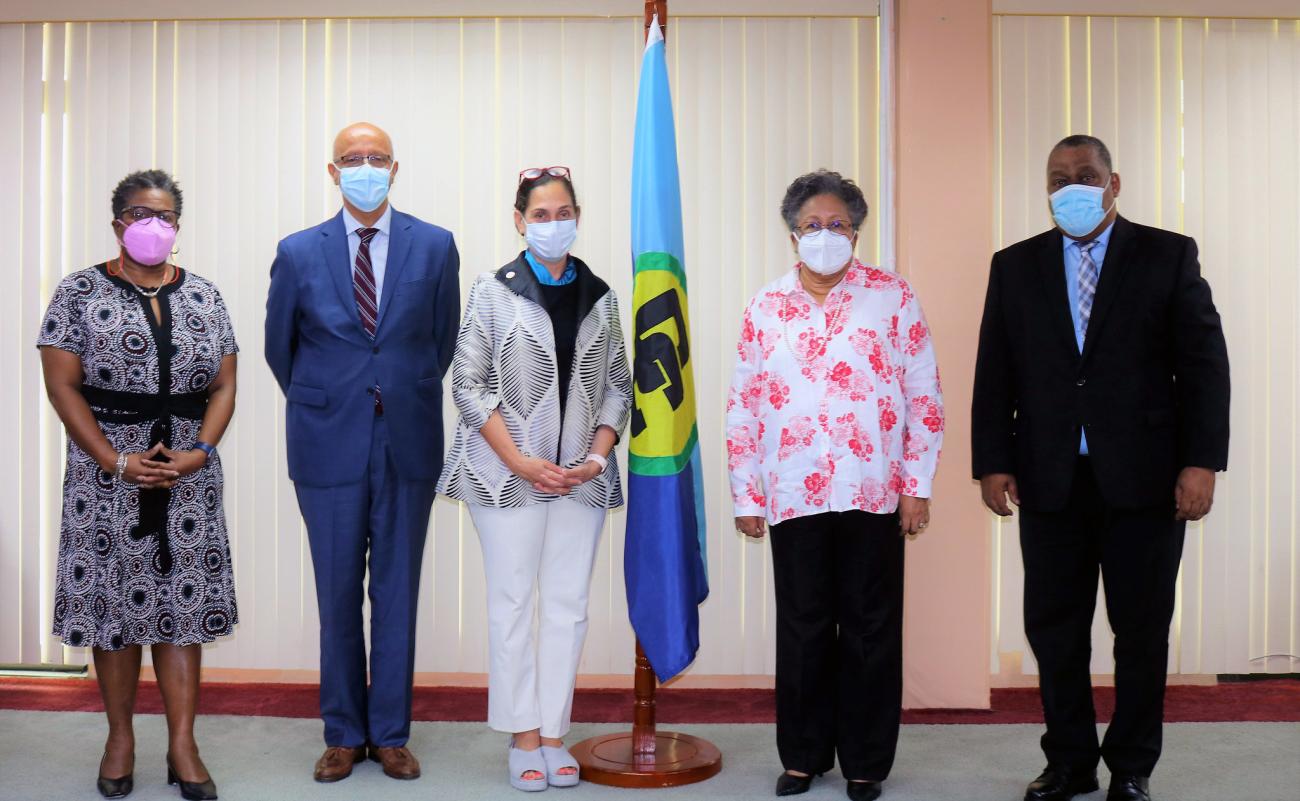On Tuesday, 12 July, 2022 Her Excellency Dr. Carla Barnett, Secretary-General of the Caribbean Community (CARICOM) received Mr. Roberto Valent, Regional Director for Latin America and the Caribbean for the Development Coordination Office (DCO) of the United Nations.
The CARICOM Secretary-General and UN Regional Director talked about their respective organizations’ work on a range of development priorities, spanning economic diversification, food security, human services, climate resilience, violence against women and girls, crime and the rule of law.
During the meeting, Dr. Barnett said, “There is urgent need to close the emissions gap to maintain global warming to well below 1.5⁰C, and to enhance global advocacy for greater access to climate financing to help Small Island and Low-lying Coastal Developing States (SIDS) address the effects of climate change and respond effectively to loss and damage caused by climatic events.” She noted the crucial role of the United Nations to enable strong advocacy on these issues.
Dr. Barnett recalled the fruitful discussions CARICOM Heads of Government held with the UN Secretary-General during the just-concluded 43rd Regular Meeting of the Conference of Heads of Government in Suriname, and looked forward to further strengthening the relationship between the CARICOM Secretariat and the United Nations Agencies that would redound to the benefit of the peoples of the CARICOM Region.
The social, economic and security situation in Haiti was also discussed. Secretary-General Barnett underscored CARICOM’s unwavering support for Haiti and said that the Community continues to urge the international community to support Haiti’s long-term development needs. She further reiterated CARICOM Heads of Government support for the renewal of the UN Office in Haiti (BINUH) with a strengthened mandate taking into account the prevailing security situation, as recommended by the UN Secretary General.
Mr. Valent stated, “The UN is committed to supporting the work of regional organizations worldwide, including CARICOM, its Secretariat and its institutions, and of course its Member States. The UN Secretary-General was at the CARICOM Heads of Government meeting in Suriname last week, and I am delighted to have been able to meet the CARICOM Secretary-General today to further those discussions.”
“Both the CARICOM SG and I know that there is a monumental effort required across the Caribbean to deliver on the promise of the Sustainable Development Goals. The Agencies, Funds and Programmes of the UN System are here for exactly this reason. Today, we spoke a little bit less about ‘what’ needs to be done, and a little bit more about how we are practically going to strengthen our developmental relationship to accelerate our shared objectives.”
Also present at the meeting were Dr. Armstrong Alexis, CARICOM Deputy Secretary-General; Ambassador Donna Forde, CARICOM Assistant Secretary-General for Foreign and Community Relations; Yeşim Oruç, UN Resident Coordinator in Guyana; Birgit Gerstenberg, UN Resident Coordinator in Belize; Mr. Didier Trebucq, UN Resident Coordinator Barbados and the OECS; and Dr. Garry Conille, UN Resident Coordinator in Jamaica, the Bahamas, Bermuda, the Cayman Islands and Turks and Caicos Islands.
Background
The UN’s cooperation with CARICOM centres around: (i) dialogue and development diplomacy mechanisms to elevate the political and developmental concerns and priorities of CARICOM member states to the appropriate organs of the UN Secretariat and other relevant inter-governmental forums; (ii) development cooperation with individual CARICOM Member States); and (iii) development cooperation and support to the CARICOM Secretariat and/or constituent CARICOM institutions and agencies.
The UN’s development cooperation with CARICOM Member States, the Secretariat, and CARICOM institutions is delivered substantially via the Multi-Country Sustainable Development Cooperation Framework (MSDCF) 2022-2026, established to support the countries of the Dutch- and English-speaking Caribbean.
The MSDCF provides signatory states with direct access to UN technical expertise and to the resources and partnerships necessary to advance Caribbean development efforts. The Framework is aligned with the Sustainable Development Goals (SDGs), the SAMOA Pathway, and the International Human Rights framework; and its strategy is built around the CARICOM Member States’ own agreed priority areas.
UN support to CARICOM is undertaken by a number of Agencies, Funds and Programmes, including the Food and Agriculture Organization (FAO); International Maritime Organization (IMO), the UN Development Programme (UNDP); UN Environment (UNEP), the United Nations Population Fund (UNFPA), UN Refugees (UNHCR), UNICEF, the International Labor Organization (ILO); World Food Programme (WFP), the International Fund for Agricultural Development (IFAD), the International Trade Centre (ITC), the UN Conference for Trade and Development (UNCTAD), the UN Regional Centre for Peace, Disarmament and Development in Latin America and the Caribbean (UNLIREC).
About CARICOM
The Caribbean Community (CARICOM) is a grouping of twenty countries: fifteen Member States and five Associate Members. Stretching from The Bahamas in the north to Suriname and Guyana in South America, CARICOM comprises states that are considered developing countries, and except for Belize, in Central America and Guyana and Suriname in South America, all Members and Associate Members are island states. CARICOM came into being on 4 July 1973 with the signing of the Treaty of Chaguaramas. The Treaty was later revised in 2002 to allow for the eventual establishment of a single market and a single economy.
Learn more about CARICOM at caricom.org.
About the UN in the Caribbean
The United Nations serves the English and Dutch-speaking Caribbean from offices that represent the Organization’s Secretariat, Specialized Agencies, Funds, Programmes, and other entities that operate at the regional, sub-regional, and country levels. Their work is coordinated through a network of six hubs based in Belize, Barbados, Guyana, Jamaica, Suriname, and Trinidad and Tobago. The four Country and two Multi-Country Teams in this network collaborate to implement the regional UN Multi-Country Sustainable Development Cooperation Framework (UN MSDCF).
Learn more about UN Caribbean at caribbean.un.org.


















